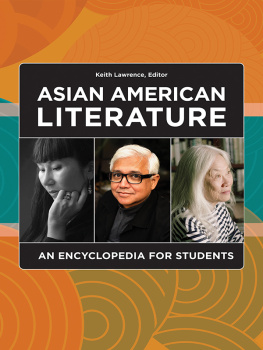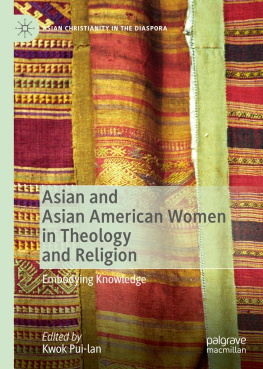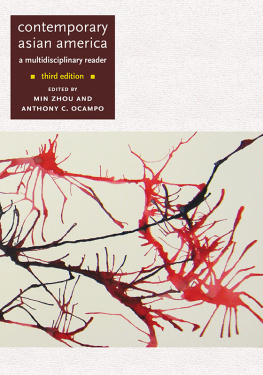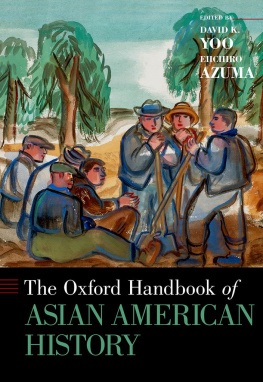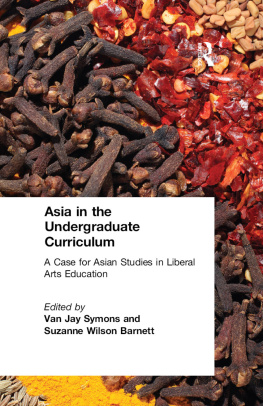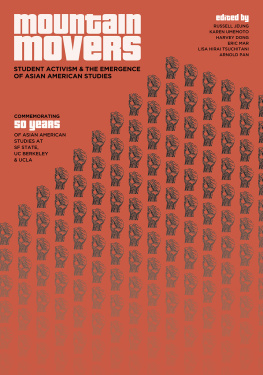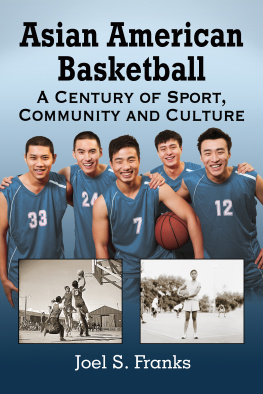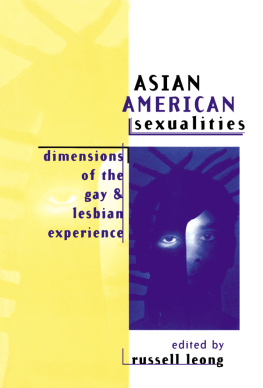Thank you for buying this ebook, published by NYU Press.
Sign up for our e-newsletters to receive information about forthcoming books, special discounts, and more!
Sign Up!
About NYU Press
A publisher of original scholarship since its founding in 1916, New York University Press Produces more than 100 new books each year, with a backlist of 3,000 titles in print. Working across the humanities and social sciences, NYU Press has award-winning lists in sociology, law, cultural and American studies, religion, American history, anthropology, politics, criminology, media and communication, literary studies, and psychology.
The Cultural Capital of Asian American Studies
The Cultural Capital of Asian American Studies
Autonomy and Representation in the University
Mark Chiang

NEW YORK UNIVERSITY PRESS
New York and London
www.nyupress.org
2009 by New York University
All rights reserved
Library of Congress Cataloging-in-Publication Data
Chiang, Mark.
The cultural capital of Asian American studies : autonomy and
representation in the university / Mark Chiang.
p. cm.
Includes bibliographical references and index.
ISBN-13: 9780814717004 (cloth : alk. paper)
ISBN-10: 0814717004 (cloth : alk. paper)
ISBN-13: 9780814717011 (pbk. : alk. paper)
ISBN-10: 0814717012 (pbk. : alk. paper)
1. Asian AmericansStudy and teaching (Higher) 2. Education,
HigherPolitical aspectsUnited States. 3. Asian AmericansEthnic
identity. 4. EthnicityPolitical aspectsUnited States. 5. Autonomy.
6. Asian AmericansPolitics and government. 7. EthnologyStudy
and teaching (Higher)United StatesCase studies. 8. Minorities
Study and teaching (Higher)United StatesCase studies. I. Title.
E184.A75C494 2009
371.82995073dc22 2009019753
New York University Press books are printed on acid-free paper,
and their binding materials are chosen for strength and durability.
We strive to use environmentally responsible suppliers and materials
to the greatest extent possible in publishing our books.
Manufactured in the United States of America
10 9 8 7 6 5 4 3 2 1
Contents
Acknowledgments
This book is the product of a long and somewhat tortuous evolution, and it has benefited greatly from the influence of a number of people, either directly or indirectly. First I would like to thank Eric Zinner for his sustained commitment to the project almost from its inception, as well as Ciara McLaughlin for shepherding the manuscript through the editorial process, and the anonymous readers for New York University Press whose incisive comments helped reshape and clarify my arguments.
Because my book is so centrally concerned with moments of origin, it seems only appropriate to acknowledge the importance of the Asian American Reading Group at the University of California at Berkeley to my own entry into the field of Asian American studies. This group consisted of Juliana Chang, Jeannie Chiu, David Eng, Candace Fujikane, Daniel Kim, Cynthia Liu, Karen Su, Theresa Tensuan, and Dorothy Wang, and they will forever be associated with my discovery of the field that has provided an intellectual home for me in the academy. Special thanks must go to Candace Fujikane for sharing with me her unique insight into local cultural politics in Hawaii and her personal archive of materials on the Blus Hanging controversy, both of which were crucial to the development of my analysis in this book.
David Lloyd and Sau-ling Wong, the cochairs of my dissertation committee, have had a profound impact on my subsequent work, and I would especially like to thank Elaine Kim for the example of her pioneering work in the field as well as for her professional guidance. I must also acknowledge my colleagues at the University of Pennsylvania: Rosane Rocher, Grace Kao, and Eiichiro Azuma in the Asian American Studies Program; and Eric Cheyfitz, Herman Beavers, and John Richetti in the English Department. John Huntington, Walter Benn Michaels, Madhu Dubey, and Mark Canuel have been both supportive colleagues and mentors in the English department at the University of Illinois at Chicago (UIC). I also am grateful to my colleagues who have worked to bring Asian American studies to UIC: Helen Jun, Gayatri Reddy, Kevin Kumashiro, Anna Guevarra, and Eric tang.
A fellowship from the Institute for the Humanities at UIC provided essential time to write, and I am grateful to its director, Mary Beth Rose. The last chapter of the book benefited from the comments and suggestions of the participants in the Junior Faculty Publication Workshop held at the Center for ethnic Studies and the Arts at the University of lowa. I thank in particular the director, Lauren Rabinowitz, and kent Ono for their detailed responses to the chapter. Josephine Lee ofered extremely helpful feedback on the manuscript in her role as the director of the Asian American Studies Consortium of the Committee on Institutional Cooperation (CIC).
Finally I must thank my parents, Han and Grace Chiang, who have been waiting too long for this book. Most of all, I want to express my appreciation to Karen Su for her support and sacrifices during the writing of this book, and especially to Miya and Zeno, who provided the raison dtre.
Introduction
Institutionalization and the Crisis of Representation
The development of Asian American studies as an academic field offers an intriguing case study in the history of the American university over the last three decades of the twentieth century. Emerging from the mass movements of the 1960s, Asian American studies has undergone major transformations over its rather brief time span. The first Asian American studies programs were established at San Francisco State College (now University) and the University of California at Berkeley in 1969, as a result of the Third World Strike, a boycott of classes by a multiracial and cross-class coalition of students, activists, and labor and community members. After protracted struggles to consolidate its presence in the university throughout the 1970s, new graduate students entered the field, and new programs began to appear at schools in places outside the West Coast in the 1980s. But then during the 1990s, tensions began to develop in the field, tensions between theory and practice, between political work and intellectual work, and between the community and the academy. They finally erupted in 1998 with the conflicts over the Association for Asian American Studies (AAAS) fiction award given to Lois-Ann Yamanakas novel Blus Hanging.
Although the protests over the fiction award nearly led to the dissolution of the association itself, this event has already begun to be forgotten.award before it was revoked raised issues such as cultural nationalism, the politics of representation, internal conflicts in the panethnic Asian American coalition, and the nature of the aesthetic and of literary value. In the wake of these events, however, it is not readily apparent what the controversy means or even why it is important to the history of the field or of Asian American politics in general. This book seeks to rectify that neglect on both counts, by arguing that the episode was significant not only as an instance of popular struggles over cultural politics, but that it also reveals certain basic lacunae in the theory and methods of Asian American studies. These absences call for a reflexive analysis of the political-intellectual project of the field, and, more specifically, for a concrete assessment of its location in the academic field and the university.
Next page

